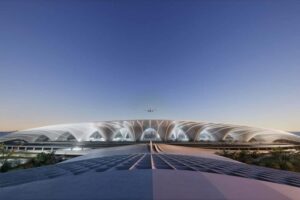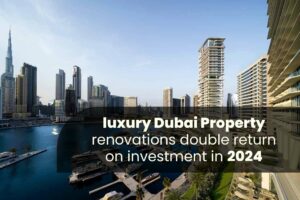
Investors worldwide are drawn to Dubai Real Estate, and as we wrap up Q4 2023, it’s time to dive into the trends shaping the market. Our insights aim to empower you, guiding your decisions in this dynamic landscape.
The Current Buzz in Dubai Real Estate
Let’s talk apartments and villas in Dubai’s prime spots. After months of impressive growth, the property scene is still buzzing.
High-end properties are the talk of the town, enjoying the perks of Dubai’s tax haven status—no income, capital gains, or property taxes for residents.
2023 stirred things up. New districts like Dubai South and Jumeirah Village Circle (JVC) are gaining traction, alongside the ever-popular Dubai Marina, Business Bay, and Dubai Silicon Oasis. The classics like Downtown Dubai and Dubai Marina? Still in the game.
Optimism fills the UAE’s real estate in 2023, thanks to high demand and limited supply. Dubai’s population surge plays a vital role, attracting both locals and newcomers. Demographic shifts, including migrant labor influx and native population growth, impact the demand for homes and businesses.
Interest rates? Big players. They sway homebuyers’ financing game. Lower rates sweeten the deal, making real estate more attractive. But higher rates? They can put a damper on things.
Dubai real estate market mirrors the local economy’s health. Economic indicators like expansion, GDP growth, and job levels shape the market. A robust, growing economy lures investors and builds real estate confidence.
Q3 2023 reported AED 96.6 billion in residential property sales. Affordable housing prices spiked by 12%, making the market more exciting.
Luxury real estate? It’s had an 8% boost per square foot. September set records with over 2,300 transactions totaling AED 12.7 billion. This quarter saw 277 residential properties sell for AED 36.7M (USD 10M) or more—a blockbuster.
Navigating the Shifting Tides of Dubai Real Estate
The Dubai Real Estate market is a dynamic arena, constantly evolving and presenting new opportunities. As we venture into 2023, the housing market continues its upward trajectory, marked by noteworthy trends and shifts that demand attention. Here’s a glimpse into the latest developments:
Rising Trend of First-Time Homebuyers:
Notably, millennials are increasingly entering the realm of homeownership. The year 2023 is witnessing a surge in first-time homebuyers, reshaping the demographic landscape of the Dubai real estate market.
Desire for Added Home Perks:
Modern homebuyers are not just looking for four walls; they desire additional perks. Homes with energy-efficient kitchens and spacious backyards are gaining favor, reflecting a shift toward more sustainable and lifestyle-oriented choices.
Emergence of Smart Home Systems:
The use of smart home systems is experiencing a notable uptick. Buyers are drawn to properties equipped with cutting-edge technology, such as automated security, lighting, and temperature control systems, enhancing convenience and efficiency.
Urban Demand for Rental Units:
Urban regions are witnessing a heightened demand for rental units. The flexibility and convenience associated with renting appeal to a growing demographic, emphasizing the need for diverse housing solutions in bustling city centers.
Navigating a Competitive Market:
The Dubai Real Estate is becoming increasingly competitive. Whether buying or selling, success requires meticulous planning and a strategic approach. Navigating through multiple offers and swiftly changing market dynamics necessitates a keen understanding of current trends.
Adapting to the ever-evolving Dubai Real Estate landscape is key to success. Staying informed about market shifts, emerging preferences, and technological advancements can significantly enhance your prospects. As the market continues to unfold, educate yourself, stay vigilant, and keep a close eye on this space for the latest updates. The journey through the Dubai Real Estate terrain is dynamic, and being well-prepared ensures you’re ready for whatever twists and turns may come your way.
Urban vs. Suburban Charm
Dubai real estate market is witnessing a shift—more folks are choosing the suburbs over the city center. Why? A quieter, serene lifestyle. Emerging areas like Dubai South and Jumeirah Village Circle (JVC) are flourishing.
Suburban living’s a hit, offering peace, larger homes, open spaces, and community vibes. With remote work on the rise, suburbs score big for larger homes and a better work-life balance. Schools, parks, and malls are all within reach, not to mention nature’s embrace, clean air, and a noise-free haven.
Tech Magic in Dubai Real Estate
Dubai Real Estate in 2023? It’s a tech marvel. Smart homes and IoT solutions are in, making life smoother. Home automation, security, and energy management are the tech trio enhancing the resident experience.
VR and AR tech are the property market’s superheroes. Prospective buyers can tour homes from their couch, soaking in the vibes without stepping outside. It’s a game-changer, especially for international buyers exploring Dubai virtually.
Online property platforms and apps are the go-to for home hunting. Detailed listings, high-res photos, and interactive maps make the search a breeze. Dubai’s blockchain game is strong, ensuring transparent transactions and speedy ownership transfers with smart contracts.
Dubai’s Sustainable Real Estate Revolution
With a growing awareness of environmental sustainability, developers in Dubai are weaving “green” elements into their projects, setting the stage for a more eco-conscious future. The year 2023 witnessed a surge in eco-friendly construction initiatives across the city, offering buyers a spectrum of choices aligned with their environmental values, ranging from energy-efficient structures to facilities with eco-conscious designs.
At the forefront of this movement is a commitment to energy efficiency. Environmentally conscious developers are prioritizing reduced energy consumption through innovative measures such as solar panels, efficient insulation, and smart lighting. These initiatives not only contribute to cost savings for residents and businesses but also play a crucial role in lowering carbon footprints.
Water conservation is another key focus of sustainable real estate projects in Dubai. The city mandates the incorporation of water-saving plumbing and electrical systems in all new developments. Technological advancements, including smart irrigation systems and low-flow plumbing fixtures, contribute to reduced water consumption and improved water management.
Dubai’s pursuit of sustainable real estate extends beyond individual buildings to encompass entire neighborhoods and urban developments. Eco-friendly zones are becoming integral parts of the city, known for their meticulous garbage collection, walkable layouts, and abundant green spaces. In a bid to minimize the carbon footprint, Dubai is actively investing in public transportation and electric vehicle charging infrastructure, further solidifying its commitment to a greener, more sustainable future.
Dubai’s Affordable Housing Landscape
In response to the escalating demand for affordable housing in Dubai, new initiatives are underway to cater to the diverse needs of the city’s population. While these endeavors present numerous possibilities, the affordable housing sector faces significant challenges within Dubai Real Estate industry.
A prominent hurdle is the scarcity of budget-friendly housing options. Despite the growing demand, Dubai grapples with a shortage of economical housing, attributed to factors such as exorbitant land and construction costs, fierce competition for available land, a complex regulatory environment, and insufficient incentives for developers.
As an illustration, what a billionaire might perceive as reasonable and affordable, possibly adding a super-luxury multi-million dirham property to a collection of summer homes, could be a financial strain for a millionaire aiming for a long-term investment or luxury residence.
In the past year, property prices in Dubai’s sought-after neighborhoods surged by 90%, fueled by heightened demand. The city’s robust economic recovery post-pandemic has led to a surge in the quest for affordable properties. Reports from Reuters affirm the stability of Dubai Real Estate market, with prices anticipated to gradually ascend over the next two years.
Affordable housing is gaining traction, with estimates suggesting costs below AED 400,000. However, challenges such as development costs and supply chain disruptions may impact residential unit deliveries this year.
Capitalizing on favorable market conditions, developers are expediting project handovers, particularly in key areas like Mohammed Bin Rashid (MBR) City, Dubailand, Jumeirah Village Circle, World Islands, and Jumeirah Village Triangle.
To stimulate the growth of Dubai’s affordable housing sector, various programs and initiatives have been introduced. The government’s affordable housing scheme facilitates property acquisition or rental for qualified residents in designated neighborhoods. The Housing Development Fund extends support for purchasing or building first homes through grants and loans, including funds for maintenance and repairs.
Playing a pivotal role, the Mohammed Bin Rashid Housing Establishment (MBRHE), a government-owned entity, enforces housing regulations and collaborates with businesses to implement low-cost housing programs.
Overseeing the Dubai Real Estate market, the Real Estate Regulatory Authority (RERA) sets standards for affordable housing developments and actively promotes the affordable housing market. The Dubai Land Department (DLD), responsible for regulating the property market, prioritizes allocating land for affordable housing projects and provides incentives to developers, marking a concerted effort to make homeownership a reality for a broader segment of Dubai’s residents.




